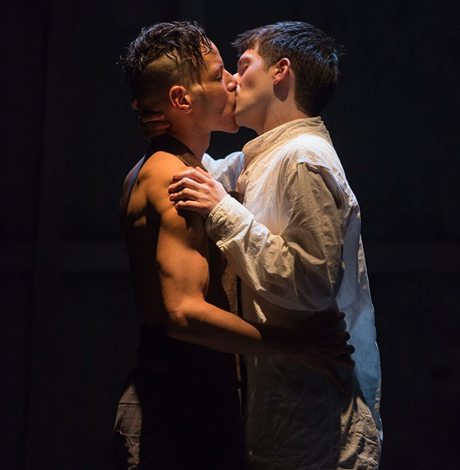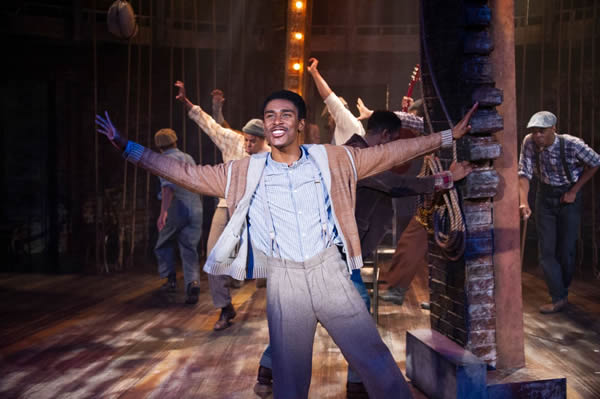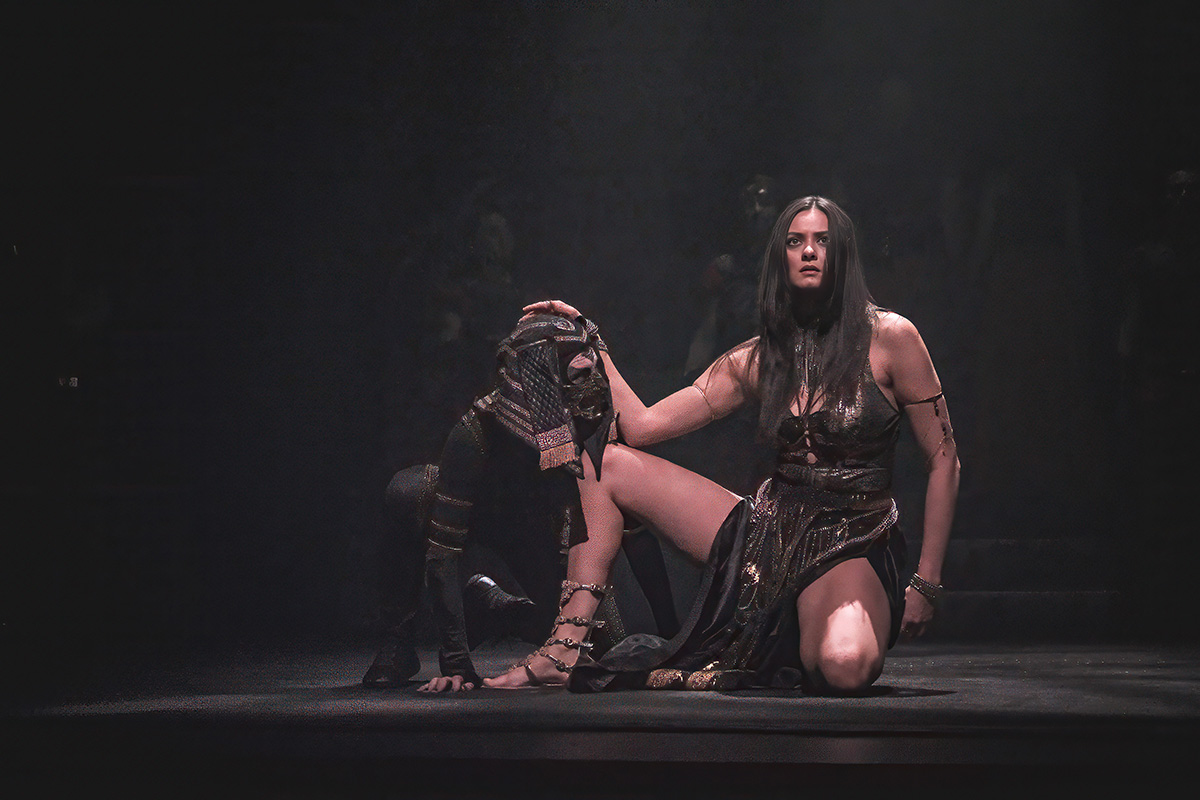Theater
Woolly’s ‘Fire’ reframes famed painter
Signature’s ‘Scottsboro Boys’ revisits grim racial tragedy


Jon Hudson Odom (left) and James Crichton in ‘Botticelli in the Fire.’ (Photo by Scott Suchman)
‘Botticelli in the Fire’
Through June 24
Woolly Mammoth Theatre Company
641 D Street, NW$20-69
202-393-3939

Lamont Walker II and the cast of ‘The Scottsboro Boys.’ (Photo by C. Stanley Photography; courtesy Signature)
‘The Scottsboro Boys’
Through July 1
4200 Campbell Avenue, Arlington
$40-110
703-820-977
Sometimes illuminations, or at least entertainment, come looking backward through a gay lens.
Woolly Mammoth Theatre Company is offering the American premiere of out playwright Jordan Tannahill’s “Botticelli in the Fire,” a boldly modern and sexy reimagining of historical gay characters in Renaissance Florence.
It opens with Sandro Botticelli (out actor Jon Hudson Odom) staggering boozily through the audience to the stage. The great Renaissance painter is ready to dish, and girl, as Tannahill would have him say, does he have a story to tell. Looking back from the beyond, Botticelli remembers halcyon days as hot art star and darling of the Medici, the de facto rulers of glorious Renaissance Florence. But that was before Botticelli’s 1497 downfall. And, as he reminds us, everybody loves to hear about a downfall.
An enthusiastic voluptuary since birth as his plainspoken mother, Madre Maria (Dawn Ursula), explains, Botticelli believes in excess, pleasure and beauty; and while mostly interested in men, he’s willing to sleep with women too. Currently, he’s having an affair with the sexually free and beautiful Clarice Orsini (Alyssa Wilmoth Keegan), and because she’s sitting for Botticelli’s masterpiece “The Birth of Venus,” their assignations are frequent. At the same time, Botticelli is falling in love with his artistically precocious, fresh-from-the-farm assistant, Leonardo Da Vinci (James Crichton). And yet he still makes time to party hard with his outrageous gay bestie Poggio du Chullu (Earl T. Kim).
But there’s trouble in the city state. Botticelli’s patron and Clarice’s husband, the ruthless Lorenzo de’ Medici (Cody Nickell) is on to their affair. And outside the cossetted confines of Botticelli’s studio and the palace, the plague has resurfaced and the populace is panicked. Citizens are aligning with conservative friar Girolamo Savonarola (Craig Wallace) and they’re burning gay artists in the town square.
Director Marti Lyons has staged a series of beautiful tableau-like scenes, some of which could stand alone. Instances include a captive Leonardo calling to God from the bottom of a medieval septic tank: “If I am a Sodomite what are you?” And later, Botticelli lies across his plainspoken mother’s lap (à la Michelangelo’s Pietà) as she sponge-bathes him. Madre Maria advises her son to choose what he loves most, advice that ultimately leads him to burn his own paintings in a dramatic burning of art, books and finery.
It’s not a perfect piece, however. The script is uneven — campy repartee between gay characters gets tired and the actors have to work hard to land some stale jokes. Luckily, the strong cast keeps things afloat.
In the queering (or reexamining history from a queer lens) of the past, Tannahill takes liberties in creating a compelling gay love story rife with anachronisms — timely and amusing — in dialogue and sublime design. We’re reminded how the rights of artists and LGBT people are, again and again, called into question.
Across the Potomac in Arlington, Signature Theatre presents John Kander and Fred Ebb’s “The Scottsboro Boys,” a musical drawn from a grim episode in American history. Like Kander & Ebb’s musicals “Cabaret” and “Chicago,” this their final collaboration also takes on social issues with great theatricality. Here, a hideous true tale of Jim Crow injustice unfolds framed as a minstrel show.
Performed beneath a decaying proscenium arch, Signature’s production, staged by out director Joe Calarco with athletic choreography by Jared Grimes is smart and compelling theater. The Depression-era story is familiar. Nine down-and-out young African-American men and boys are riding the rails in search of work when they are falsely accused of rape by two young white women. Immediately jailed in Scottsboro, Ala.,, they are tried and condemned to death. Their fate becomes a cause with New York liberals, prompting famed Jewish defense attorney Samuel Leibowitz to take their case which leads to subsequent retrials and convictions.
Stacked with minstrel stock characters — the Interlocutor, or emcee (Christopher Bloch), who represents the voice of the Old South, and broad comics Mr. Bones (the excellent Stephen Scott Wormley) and Mr. Tambo (Chaz Alexander Coffin) — we’re offered a glimpse into American theater history. As communicated by Kander and Ebb, the experience isn’t always easy. It’s sometimes uncomfortable to reconcile cake-walking, tap dancing choreography and the score’s upbeat ragtime tunes with themes of racism, anti-Semitism, injustice and brutality.
The focus is pulled on the most defiant of the Scottsboro boys, Haywood Patterson (played gracefully by Lamont Walker II). Other cast standouts include Aramie Payton as 12-year-old Eugene, the youngest of the accused, and DeWitt Fleming, Jr., who plays one of the boys as well as star witness Ruby Bates.
Well into the second act, when the young convicts’ last glimmer of hope for vindication is sufficiently dashed, things become especially heartbreaking. And the show’s final number in which the actors playing the boys relay their character’s uniformly tragic ends proves even sadder.
Theater
Voiceless ‘Antony & Cleopatra’ a spectacle of operatic proportions
Synetic production pulls audience into grips of doomed lovers’ passion

‘Antony & Cleopatra’
Through Jan. 25
Synetic Theater at
Shakespeare Theatre Company’s Klein Theatre
450 7th St., N.W.
Synetictheater.org
A spectacle of operatic proportions, Synetic Theater’s “Antony & Cleopatra” is performed entirely voiceless. An adaptation of the Bard’s original (a play bursting with wordplay, metaphors, and poetic language), the celebrated company’s production doesn’t flinch before the challenge.
Staged by Paata Tsikurishvili and choreographed by Irina Tsikurishvili, this worthy remount is currently playing at Shakespeare Theatre Company’s Klein Theatre, the same venue where it premiered 10 years ago. Much is changed, including players, but the usual inimitable Synectic energy and ingenuity remain intact.
As audiences file into the Klein, they’re met with a monumental pyramid bathed in mist on a dimly lit stage. As the lights rise, the struggle kicks off: Cleopatra (Irina Kavsadze) and brother Ptolemy (Natan-Maël Gray) are each vying for the crown of Egypt. Alas, he wins and she’s banished from Alexandria along with her ethereal black-clad sidekick Mardian (Stella Bunch); but as history tells us, Cleopatra soon makes a triumphant return rolled in a carpet.
Meanwhile, in the increasingly dangerous Rome, Caesar (memorably played by Tony Amante) is assassinated by a group of senators. Here, his legendary Ides of March murder is rather elegantly achieved by silver masked politicians, leaving the epic storytelling to focus on the titular lovers.
The fabled couple is intense. As the Roman general Antony, Vato Tsikurishvili comes across as equal parts warrior, careerist, and beguiled lover. And despite a dose of earthiness, it’s clear that Kavsadze’s Cleopatra was born to be queen.
Phil Charlwood’s scenic design along with Colin K. Bills’ lighting cleverly morph the huge pyramidic structure into the throne of Egypt, the Roman Senate, and most astonishingly as a battle galley crashing across the seas with Tsikurishvili’s Antony ferociously at the helm.
There are some less subtle suggestions of location and empire building in the form of outsized cardboard puzzle pieces depicting the Mediterranean and a royal throne broken into jagged halves, and the back-and-forth of missives.
Of course, going wordless has its challenges. Kindly, Synectic provides a compact synopsis of the story. I’d recommend coming early and studying that page. With changing locations, lots of who’s who, shifting alliances, numerous war skirmishes, and lack of dialogue, it helps to get a jump on plot and characters.
Erik Teague’s terrific costume design is not only inspired but also helpful. Crimson red, silver, and white say Rome; while all things Egyptian have a more exotic look with lots of gold and diaphanous veils, etc.
When Synetic’s voicelessness works, it’s masterful. Many hands create the magic: There’s the direction, choreography, design, and the outrageously committed, sinewy built players who bring it to life through movement, some acrobatics, and the remarkable sword dancing using (actual sparking sabers) while twirling to original music composed by Konstantine Lortkipanidze.
Amid the tumultuous relationships and frequent battling (fight choreography compliments of Ben Cunis), moments of whimsy and humor aren’t unwelcome. Ptolemy has a few clownish bits as Cleopatra’s lesser sibling. And Antony’s powerful rival Octavian (ageless out actor Philip Fletcher) engages in peppy propaganda featuring a faux Cleopatra (played by Maryam Najafzada) as a less than virtuous queen enthusiastically engaged in an all-out sex romp.
When Antony and Cleopatra reach their respective ends with sword and adder, it comes almost as a relief. They’ve been through so much. And from start to finish, without uttering a word, Kavsadze and Tsikurishvili share a chemistry that pulls the audience into the grips of the doomed lovers’ palpable passion.
Theater
Ford’s ‘First Look’ festival showcases three new productions
A chance to enjoy historical dramas for free before they’re completed

The Ford’s Theatre Legacy Commissions: A First Look – 2026
Jan. 16 & 17
Ford’s Theatre
511 Tenth St., N.W.
FREE
Fords.org
When Ford’s Theatre debuted its new plays festival, “A First Look,” in 2023, it was unclear whether people would come for the staged readings.
“Before the pandemic if you announced the reading of a play, 12 people might show up,” says José Carrasquillo, director of artistic programming at Ford’s Theatre. “Since then, we’ve experienced comparatively massive turnout. Maybe because it’s cheap, or because of the very newness of the works.”
This year’s fourth edition showcases readings of three pieces currently in varied stages of development. The free, two-day festival offers audiences a chance to encounter historical dramas long before they’re completed and fully produced. None are finished, nor have they been read publicly. And befitting the venue’s provenance, the works are steeped in history.
The festival kicks off with “Springs” by playwright Jeanne Sakata and directed by Jessica Kubzansky. Commissioned by The Ford’s Theatre Legacy Commissions, it’s the both epic and personal story of Sakata’s Japanese American family including her grandfather’s experience in an internment camp.
“Sakata’s immigrant grandfather was an exceptionally skilled farmer who helped to stave off starvation in the camp. Still, he never gave up on the idea that he belonged in America. It’s very much a story of today,” says Carrasquillo.
Unlike “Springs,” the festival’s two other works weren’t commissioned by Ford’s. But they both fit the history brief and likely will benefit from the exposure and workshopping.
“Providence Spring,” by California based playwright Richard Helesen and directed by Holly Twyford, portrays Clara Barton (played by local favorite Erin Weaver) as a hero beyond the Red Cross whose then-radical initiatives included cataloguing the Civil War dead, many pulled from mass graves.
Directed by Reginald L. Douglas, “Young John Lewis: Prodigy of Protest” explores a slice from the life of the legendary civil rights activist and longtime congressman. With book and lyrics by Psalmayene 24 and music by Kokayi this collaboratively staged reading between Ford’s and Mosaic Theater is slated to premiere fully produced at Mosaic as a 90-minute musical in the spring of 2026.
“When I was hired at Ford’s in 2018, we began discussing hiring writers who do historical drama,” says Carrasquillo. “Our intention was resolute, but we didn’t do it right away. It took getting through the pandemic to revisit the idea.”
At the same time, the racial reckoning spurred Ford’s to hire playwrights of color to tell stories that had previously been forgotten or ignored.
For Carrasquillo, who is gay, the impulse to commission was crystalized when he saw the film “Hidden Figures,” a true story about “three brilliant African-American women — at NASA during the Space Race, overcoming racial and gender discrimination to make crucial contributions to America’s spaceflight success.” He says, “the film floored me. How many stories like this are there that we don’t know about?”
One of the festival’s happiest experiences, he adds, was the commission of playwright Chess Jakobs’s “The American Five” and its subsequent success. It’s the story of Martin Luther King Jr. and his inner circle, including Bayard Rustin (MLK’s brilliant, unsung gay adviser) leading up to the 1963 March on Washington. The play later premiered fully produced in Ford’s 2025 season.
Increasingly, the readings at Ford’s have become popular with both artists and audiences.
At Ford’s, Carrasquillo wears many hats. In addition to selecting plays and organizing workshops, he serves as an in-house dramaturg for some of the nascent works. But he’s not alone. Also helming the festival are senior artistic advisor Sheldon Epps, and The Ford’s Theatre Legacy Commissions advisor Sydné Mahone.
Because the plays are in development, comments from directors, dramaturgs, and the audience are considered and may become part of the playwrights’ rewrites and changes. If and when the play resurfaces fully produced, audience members might find their suggestion in the completed work.
Is this year’s festival queer influenced? Yes, both by those involved and the topics explored.
Carrasquillo explains, “While Sakata’s “Springs” is primarily about immigration, its message is relevant to the queer community. Civil rights are being taken away from us. We need this playwright’s story to know what has happened and what can happen to any of us.
“Many of Ford’s legacy commissions underscore the importance of civil rights in our country and that’s important to all of us. Queer and not queer.”

It’s been a year filled with drama and music, re-imaginings and new works. There was a lot on offer in 2025, and much to enjoy. Here are 10 now-closed productions that come to mind.
On Valentine’s Day at Folger Theatre on Capitol Hill, out actor Holly Twyford served as narrator for “The Love Birds” a Folger Consort work that melds medieval music with a world-premiere composition by acclaimed composer Juri Seo and readings from Geoffrey Chaucer’s “A Parlement of Foules”
Standing behind a podium, Twyford beautifully read Chaucer’s words (translated from Middle English and backed by projected slides in the original language), alternating with music played on old and new instruments.
While Mosaic Theater’s “A Case for the Existence of God,” closed in mid-December, it’s proving a production not soon forgotten. Precisely staged by Danilo Gambini, and impressively acted by Lee Orsorio and Jaysen Wright, the soul-searching two hander by out playwright Samuel D. Hunter, tells the story of two men who form an unlikely friendship based on single-fatherhood, a specific sadness, and hope.
The action unfolds in a small office in southern Idaho, where the pair discuss the perplexing terms of a mortgage loan while delving deep into their lives and backgrounds. Nothing is left off the table.
Shakespeare Theatre Company’s spring production of “Uncle Vanya” gave audiences something both fresh yet enduring. Staged by STC’s artistic director Simon Godwin, the production put an impeccably pleasing twist on Russian playwright Anton Chekhov’s classic. It ranks among the very best area productions of the year.
Featuring a topnotch cast led by Hugh Bonneville (TV’s “Downton Abbey”) in the title role, the play was set on an unfinished stage cluttered with costume racks and assorted props, all assembled by crew uniformed in black and actors in street clothes. Throughout the drama tinged with comedy, the actors continued to assist with ever increasingly period set changes accompanied by an underscore of melancholic cello strings. It was innovative and wonderful.
GALA Hispanic Theatre’s production of Manuel Puig’s “Kiss of the Spider Woman” was an intimate and affecting piece of theater. Staged by José Luis Arellano, it starred out actors Rodrigo Pedreira and Martín Ruiz as two very different men whose paths cross as convicts in an Argentine prison.
Arena Stage scored with a re-imagined and updated take on the widely liked musical “Damn Yankees.” Directed by Sergio Trujillo, the Broadway bound production has been “gently re-tooled for its first major revival in the 21st century,” moving the action from the struggling Washington Senators baseball team to the turn-of-the-century Yankees lineup. Ana Villafañe’s charmingly seductive Lola and a chorus of fit ball players made for a good time.
Also at Arena, out playwright Reggie D. White’s new work “Fremont Ave.” was very well received. A semi-autobiographical glimpse into home and the many definitions of that idea specifically relating to three generations of Black men, the work boasts a third act with a deeply queer storyline to boot.
Before his smash hit “Hamilton” transformed Broadway, Lin-Manuel Miranda wrote “In the Heights,” a seminal musical set against the vicissitudes of an upper Manhattan bodega. Infused with hip-hop, rap, and pop ballads, the romance/dramedy takes place over a lively few days in the vibrant, close-knit Latin neighborhood, Washington Heights.
Signature Theatre’s exciting take on “In the Heights” featured a talented cast including out actor Ángel Lozado as the bodega owner who figures prominently in the barrio and the action.
Studio Theatre’s recent production of lesbian playwright Paula Vogel’s newest work “The Mother Play,” a drama with humor, is about a well put together alcoholic mother and her two gay children living under difficult circumstances in the less glitzy parts of suburban Maryland. With nuanced performances and smart direction, the production was terrific.
Keegan Theatre surpassed expectations with its production of “Lizzie” a punk rock opera about Miss Borden, the fabled axe wielding title character. Performed by a super all-female cast, they belted a score that hits hard on subjects like money, queerness, and strained (to say the least) family relationships.
Round House Theatre impressed autumn audiences with “The Inheritance,” a two-part drama sensitively staged by out director Tom Story and acted by a mostly queer cast that included young actor Jordi Bertrán Ramírez in a breakout performance.
Penned by out playwright Matthew López, the epic work inspired by E.M. Forster’s novel “Howards End,” explores themes of love, legacy, and the AIDS crisis through the lives of three generations of gay men in New York City.
Prior to opening, Story commented that with the production’s predominately queer cast you get actors who “really understand the situation, the humor, and the struggle. It works well.” And he was right.




















